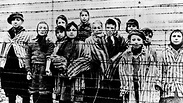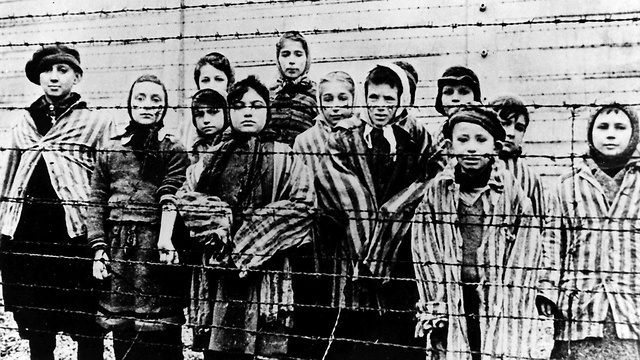
The liberation of Auschwitz in 1945
צילום: AP
Poland freezes Holocaust survivors' property restitution bill
73 years after World War Two ended, restitution for lost Jewish property has not yet been regulated in Poland, with new bill dealing with issue put on hold, possibly due to 'death camp law'; 'Survivors can't wait,' says Jewish organization; Polish Senate speaker also appealed to Poles living abroad to report to the authorities any statements hurting 'Poland's good name.'
The government of Poland has decided to reexamine a draft bill on restitution for Holocaust survivors whose property was confiscated during World War Two. The bill was put up for inspection by the country's Justice Ministry, and may be shelved altogether.
The World Jewish Restitution Organization (WJRO) voiced deep concern by the decision and called on the Polish government to move forward quickly with improved legislation to address property confiscations.
"We urge the government of Poland to quickly pass amended legislation that is just and fair for all who lost property, including Polish survivors of the Holocaust and their families," said WJRO Chair of Operations Gideon Taylor.
"We are concerned that this administrative step will delay passage of this legislation. Elderly Jewish and non-Jewish claimants who have waited over 70 years for justice for their lost property cannot wait any longer," Taylor added.
Jewish sources within the country said they presumed the law's return to the Justice Ministry was caused by a rising wave of anti-Semitism in the European country, which raised concerns in the upper echelons of government that speaking about returning lost property to Jews will not be taken well by the public.
The draft bill, originally published October of last year amid an international storm, was supposed to be approved by late 2017. WJRO soundly criticized it the moment it was made public, since it included articles that effectively blocked the vast majority of survivors and their families from ever receiving any restitution.
Israel officially communicated its protest to the Polish government, as did the administration of President Donald Trump and other European governments.
According to the bill, a Holocaust survivor seeking to file a claim for restitutions must be a current citizen of Poland and needs to have lived in the country when his or her property was seized by the post-war communist regime.

The liberation of Auschwitz in 1945. Poland remains the only major European country to have not enacted a law providing restitution for lost property (צילום: AP)
Additionally, under the proposed law, heirs will be able to file a claim, but they must be children or grandchildren of the survivors.
The stringent conditions preclude most survivors from filing a claim, since many Jewish families living in Poland were annihilated during the war by the Nazi regime, leaving no heirs to claim the property, while most who survived left Poland during the Holocaust or shortly afterwards.
The bill further lists other limitations, including survivors not being to file claims regarding property they owned through stocks in a company. In addition, the bill said that once it was made law, claims will only be possible for a year before property reverts to the Polish Finance Ministry.
The WJRO has been urging the Polish government since 1993 to provide the appropriate, extensive attention required to returning property owned by the country's Jewish community, 90 percent of which was murdered during the Holocaust.
Poland, in fact, remains the only major European country that has not yet enacted a law for the restitution of Jewish property seized by the Nazis or the country's regime.
Polish Deputy Justice Minister Patrick Yaki said when the bill was originally published in October that he was "ashamed that only now, 28 years after the communist regime was toppled, was such a law being drafted. This issue should have been resolved long ago."
Due to the outcry and controversy surrounding the law, Poland's Prime Minister Mateusz Morawiecki began personally overseeing the bill's drafting. As a result, some progress had been made and some of the bill's more draconian articles were apparently removed, but now—with the controversy surrounding the "death camp bill"—Poland has decided to return the law for examination by the Justice Ministry for reasons unknown.
While the property issue has yet to be resolved, Polish parliament removed from its docket a bill to limit kosher slaughter in the country, and will not be putting it to a vote.
Had the bill been enacted, it would have banned the export of kosher meat from Poland, intended for many Jewish communities in Europe and even Israel.
Senior Polish official appeals to citizens to report anti-Polish sentiment abroad
Poland's senate leader has appealed to Poles living abroad to report to the authorities any statements deemed to hurt "Poland's good name"—part of a wider campaign by the government to defend the country against what it calls historical untruth and slander.

Polish Senate Speaker Karczewski appealed to Poles living abroad to report to the authorities any statements deemed to hurt 'Poland's good name' (Photo: Karczewski's Twitter account)
The letter, posted recently on the Senate's website and reported by German media Thursday, is linked to a controversial new law that penalizes publicly and falsely attributing the crimes of Nazi Germany to the Polish nation. The government insists it is not to block historical research, but critics say its wording is unclear.
Israel has vehemently protested the law, adopted earlier this month, saying it could limit discussion about the Holocaust and whitewash the role some Poles played during Germany's occupation of Poland from 1939 to 1945. The United States has also expressed "disappointment" over the law.
Observers say the campaign, which also includes ads on YouTube, is a means for the ruling Law and Justice party to consolidate its power by rallying voters around the idea that Poland needs to be defended against a hostile outside world.
In his letter sent last week to Polish organizations in the world, Senate Speaker Stanisław Karczewski appealed to millions of their members to "document and react" to signs of anti-Polish sentiment and "statements and opinions that hurt (Poland's good name)" and to report them to Polish diplomatic missions.
The letter acknowledges individual Poles committed shameful deeds during the war, but that they were not typical of the entire nation.
In Germany, a senior member of Chancellor Angela Merkel's Christian Democratic Union party called the letter "regrettable."
"This partisan tactic consists in spreading the feeling in Poland that they're being treated unjustly abroad," Norbert Roettgen told the Thursday issue of the German newspaper Berliner Zeitung.
"This political behavior by the government and by the (Law and Justice) party leader Jaroslaw Kaczynski is a shame and very regrettable," he added.












